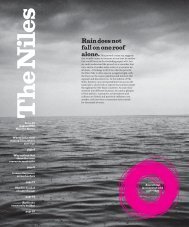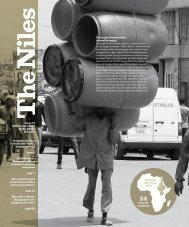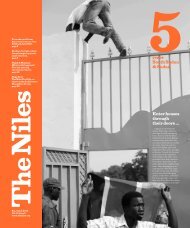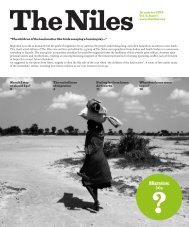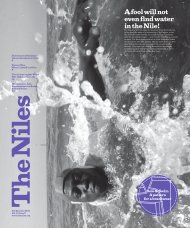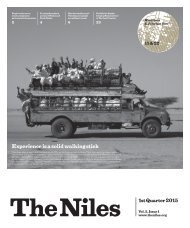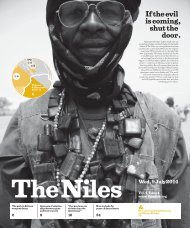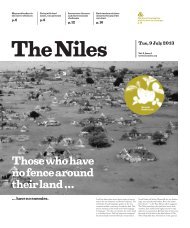A boat cannot go forward if each rows his own way
Be it to improve irrigation, manage floods and droughts or generate energy; dams have played a significant role in humanity’s progress. But the dam-building development model also has its flaws. The Niles journalists tackle the sensitive dam topic and self-aware that they all are in the same boat, they agree that it is time to start rowing the same way.
Be it to improve irrigation, manage floods and droughts or generate energy; dams have played a significant role in humanity’s progress. But the dam-building development model also has its flaws. The Niles journalists tackle the sensitive dam topic and self-aware that they all are in the same boat, they agree that it is time to start rowing the same way.
Create successful ePaper yourself
Turn your PDF publications into a flip-book with our unique Google optimized e-Paper software.
26 TN
Do we need a framework
for dams?
Waakhe Simon Wudu
Juba, South Sudan
The Eastern Nile Technical Regional Office (ENTRO) is drawing up a coordination framework
for dams in the region, aiming to ease conflicts about dams and water supply in the future.
T
he planned framework seeks to organise and coordinate the operation
of dams in the Eastern Nile Basin, according to Michael Abebe, the
Regional Coordinator for Water Resources and Dam Safety at the Eastern
Nile Technical Regional Office (ENTRO) in Addis Ababa.
“In the last ten years many more dams were constructed in the Nile
Basin, so the issue is getting more attention,” said Abebe, of the planned
coordination mechanism, which comes against a backdrop of rising
tensions between countries about dams and water usage.
It aims to maximise dams’ benefits, helping to make the most of the
water resources in the basin for the riparian states who share the waters
of the Nile. It also reduces risks of inefficient or unsafe operation of
dams along the Blue Nile.
Work began on the framework back in 2018, and it will detail how
countries can cooperate on dams’ operation.
Once the ENTRO technical team, in close coordination with the
countries of the Eastern Nile region, has finished the framework,
likely in two- or three-years time, it will need to be adopted by ENTRO
member states.
Rising conflicts
Tensions have emerged between the Nile Basin Initiative (NBI)
member states as dams are constructed. For example, a long-running
dispute between Ethiopia, Egypt, and Sudan over the waters of the
Nile flared in 2020, as Ethiopia moves toward completion of Africa’s
largest hydroelectric power project, the Grand Ethiopian Renaissance
Dam (GERD).
“Effective management must
be approached from a basin-wide
perspective.”
“The dispute over the GERD is part of a feud the downstream states
on the one hand, and Ethiopia and the upstream riparians on the other
over access to the Nile’s waters, which are considered a lifeline for
millions of people living in Egypt and Sudan,” writes John Mukum
Mbaku, Nonresident Senior Fellow - Global Economy and Development,
Africa Growth Initiative in an article published on Brookings.
“Despite the intense disagreements, though, Ethiopia continues to
move forward with the dam, arguing that the hydroelectric project will
significantly improve livelihoods in the region more broadly,” he adds.
Observers say that more dams are likely amid rising demand for water
and other services. Currently, the population of the NBI member states
is estimated to be around 505 million.
Dr Mohsen Alarabawy, Regional Technical Specialist at the NBI, says
the region’s population increases by 2.5 percent annually. The basin’s
total population is on track to double by 2050. This will mean increasing
usage of the Nile waters as the population increases, putting intense
pressure on water supply.
Although organisations such as the NBI have worked for decades
to ensure the best use of the Nile’s waters in the region, there is still
no overarching coordination mechanism for dams.
“Unless you manage them properly or you coordinate your operation,
there might be a scarcity of water in the region again because of security
issues,” Abebe said.
Averting water wars
Nhial Tiitmamer, an environmental expert from South Sudan, said
a framework on dam management “will reduce conflicts between member
states and build cooperation instead of antagonism”.
“Most of the focus on dams has been on safety and environmental
and social impacts of the dams, but there has been less focus on the
rights and obligations of member states sharing an international river
such as the Nile River,” he added.
The World Commission on Dams has underscored the need
for moves to eliminate conflict relating to dams. It outlines bestpractice
models and bleakly states: “when rivers cross borders within
or between nations, water scarcity leads to water stress which leads
to water wars.”
“Decisions on dams must respond to a wide range of needs,
expectations, objectives and constraints. As matters of public choice
and policy, they will always reflect competing interests and require
negotiation.”
“The Nile riparians must understand that the river is a common
resource whose effective management must be approached from
a basin-wide perspective. Thus, it is only through cooperation that
Egypt, Ethiopia, Sudan, and the other riparians can peacefully resolve
conflicts over the Nile and achieve the type of water use that will
contribute significantly to regional economic and human development,”
recommends John Mukum Mbaku.
Coordinating the operation of dams in the Eastern Nile Basin is
a crucial pillar of managing the Nile waters. If adopted by the ENTRO
member states, the suggested coordination framework for operating
dams would significantly contribute to ensure equitable water supply
for all Nile Basin citizens in the future. And with every new dam being
constructed, the need for such a framework increases.
TN
TN15_20210310.indd 26 2021/03/10 18:29









